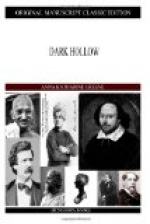“The prosecution, in the able hands of District Attorney Foss, made all its points this morning. Unless the defence has some very strong plea in the background, the verdict seems foredoomed. A dogged look has replaced the callous and indifferent sneer on the prisoner’s face, and sympathy, if sympathy there is, is centred entirely upon the wife, the able, agreeable and bitterly humiliated landlady of Claymore Tavern. She it is who has attracted the most attention during this trial, little as she seems to court it.”
“Only one new detail of evidence was laid before the jury to-day. Scoville has been known for some time to have a great hankering after a repeating watch. He had once seen that of Algernon Etheridge, and was never tired of talking about it. Several witnesses testified to his various remarks on this subject. Thus the motive for his dastardly assault upon an unoffending citizen, which to many minds has seemed lacking, has been supplied.
“The full particulars of this day’s proceedings will be found below.”
We omit these to save repetition; but they were very carefully conned by Deborah Scoville. Also the following:
“The defence is in a line with the statement already given out. The prisoner acknowledges taking the watch but from motives quite opposed to those of thievery. Unfortunately he can produce no witnesses to substantiate his declaration that he had heard voices in the direction of the bridge while he was wandering the woods in search of his lost child. No evidence of any other presence there is promised or likely to be produced. It was thought that when his wife was called to the stand she might have something to say helpful to his case. She had been the one to ultimately find and lead home the child, and, silent as she had been up to this time, it has been thought possible that she might swear to having heard these voices also.
“But her testimony was very disappointing. She had seen nobody, heard nobody but the child whom she had found playing with stones in the old ruin. Though by a close calculation of time she could not have been far from Dark Hollow at the instant of the crime, yet neither on direct or cross-examination could anything more be elicited from her than what has been mentioned above. Nevertheless, we feel obliged to state that, irreproachable as her conduct was on the stand, the impression she made was, on the whole, whether intentionally or unintentionally, unfavourable to her husband.
“Some anxiety was felt during the morning session that an adjournment would have to be called, owing to some slight signs of indisposition on the part of the presiding judge. But he rallied very speedily, and the proceedings continued without interruption.”
“Ah!”




